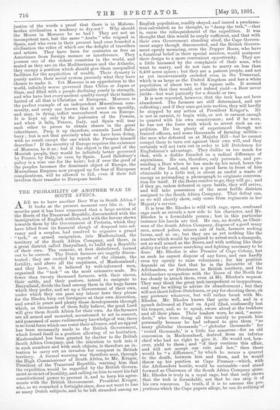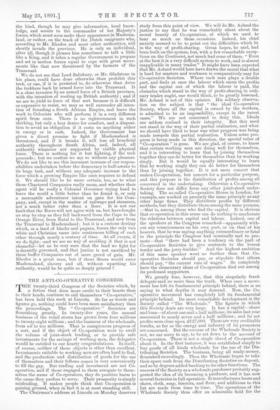THE PROBABILITY OF ANOTHER WAR IN SOUTH AFRICA. A RE we
to have another Boer War in South Africa ? It looks at the present moment very like it. For months past it has been rumoured. that a large section of the Boers of the Transvaal Republic, discontented with the immigration of English settlers, and with the favour shown towards them by the Government of Pretoria, which they have lifted from its financial slough of despond into sol- vency and a surplus, had resolved to organise a grand • " trek," or armed emigration, into Mashonaland, the territory of the South Africa Company, and there, in a great district called Banyailand, to build up a Republic of their own. The rumour, at first disbelieved, turned out to be correct. The Dutch farmers are angrily discon- tented ; they are excited by reports of the climate, the fertility, and above all the emptiness, of Mashonaland ; and they have, it is believed by well-informed men, organised the " trek " on the most extensive scale. No fewer than twenty thousand farmers, with their slaves, their cattle, and theirpastors, intend—to emigrate to Bauyailand, divide the land among them in the huge farms which they prefer, and set up a Government of their own, under which they can pass any labour laws they please for the Blacks, keep out foreigners at their own discretion, and await in peace and plenty those developments through which, as thousands of them fully believe, the good Lord will give them South Africa for their own. As the farmers are all armed and mounted, accustomed to act in concert, and possessed of some rudimentary knowledge of war, there is no local force which can resist their advance, and an appeal has been necessarily made to the British Government, which found itself in a position allowing of no hesitation. Mashonaland has been granted by charter to the British South Africa Company, and the intention to trek into it in such numbers and with such objects, is therefore an in- tention to carry out an invasion for conquest in British territory. A formal warning was therefore sent, through the High Commissioner of South Africa, to Mr. Kruger, President of the Transvaal Republic, warning him that the expedition would be regarded by the British Govern- ment as an act of hostility, and calling on him to exert his full constitutional power to prevent it, and to keep his agree- ments with the British Government. President Kruger, who, as we remarked a fortnight since, does not want to lose so many Dutch subjects, and to be left stranded among an English population, readily obeyed, and issued a proclama- tion calculated, as he thought, to " damp the trek,"—that is, cause the relinquishment of the expedition. It was thought that this would be amply sufficient, and that with their own Government standing aloof, the Cape Govern- ment angry though disconcerted, and the British Govern- ment openly menacing, even the Dopper Boers, who have a fanatical belief in their special mission, would postpone their design to a more convenient opportunity. They are a little harassed by the complaints of their sons, who want to marry, and do not care to marry on less than 6,400 acres apiece ; but they are a patient people, and not as yet inconveniently crowded even in the Transvaal, which is as large as the United Kingdom and has a white population of about two to the square mile. It seemed probable that they would, not indeed yield—a Boer never yields—but wait patiently for a decade or two. It is now reported, however, that the trek has not been abandoned. The farmers are still determined, and are collecting; and if they once get into motion, they will hardly be stopped by any action of President Kruger's. He is not in earnest, to begin with, or not in earnest enough to quarrel with his own countrymen ; and if he were, he has not the force with which to arrest such an ex- pedition. He has plenty of experienced though not trained officers, and some thousands of farming militia— the men who defeated us at 3Iajuba. Hill—but he cannot compel them to turn out against their own will, and they certainly will not turn out in order to kill Dutchmen for Englishmen's advantage. They dislike us too much for that, with a dislike founded on a radical difference of aspirations. He can, therefore, only persuade, and per- suading a Boer when he has made up his mind, hears the word of the Lord, and sees a good farm in front of him obtainable by a little toil, is about as useful a waste of energy as persuading a phonograph to originate conversa- tion for itself. If the Boers resolve to go, they will go ; and if they go, unless defeated in open battle, they will arrive, and will take possession of the most fertile districts assigned to the South Africa Company. That defeat can, as we will shortly show, only come from regiments in her Majesty's service. It is true Mr. Rhodes is wild with rage, open, confessed rage such as reveals a new side to his character, and Mr. Rhodes is a formidable person ; but in this particular instance his hands are tied. He can, no doubt, as Chair- man of the South Africa Company, dispose of a good many men, armed police, miners out of luck, farmers seeking farms, and so on ; but they are as yet nothing like the number which would be required to arrest such a stampede, not so well armed as the Boers, and with nothing like their ability for the severe marching and fighting necessary to be done. Mr. Rhodes is also Premier of Cape Colony, but as such he cannot dispose of any force, and can hardly even try openly to raise volunteers ; for his position depends on the fact that he is the favourite of the Afrikanders, or Dutchmen in British territory, and the Afrikanders sympathise with the Boers of the North far too closely to attack them, even at Mr. Rhodes's request. They may think the great trek inexpedient or inopportune, and may be willing to advise its abandonment ; but they will not shoot fellow-Dutchmen, or pay for shooting them, on any pretence whatever, but will rather break with Mr. Rhodes. Mr. Rhodes knows that quite well, and in a speech delivered at Paarl on April 22nd, confessedly lost his temper, and, so to speak, swore aloud at the trekkers and all their plans. Their leaders were, he said, " scoun- drels," who were doing all this mainly to punish him. personally because he had refused to give them " so many globular thousands "—' globular thousands' for round thousands,' is a little too sonorous—for an old concession in Mashonaland, derived from an inferior chief who had no right to give it. He would not, how- ever, yield to them ; and " if they continue this affair, and will not accept our rule and law," then there would be " a difference," by which he means a quarrel to the death, between him and them, and he would throw up his position as Cape Premier—which, with the Afrikanders hostile, would be untenable—and stand forward as Chairman of the South Africa Company alone. Mr. Rhodes is truly in a royal rage, but that only shows that the trek is formidable, not that he can stop it of his own resources. In truth, if it is to assume the pro- portions which the Cape papers allege, he can do nothing of the kind, though he may give information, local know- ledge, and scouts to the commander of her Majesty's forces, which must soon make their appearance in Mashona- land, or rather, on the track of the Dutch emigrants who, according to Mr. Rhodes and most other authorities, will shortly invade the province. He is only an individual, after all, though it pleases him sometimes to talk a little like a King, and it takes a regular Government to prepare and set in motion forces equal to cope with great move- ments like that now threatened by the farmers of the Transvaal.
We do not see that Lord Salisbury, or Mr. Gladstone in his place, could have done otherwise than prohibit this trek, or can, if it is persisted in, do otherwise than drive the trekkers back by armed force into the Transvaal. It is a clear invasion by an armed force of a British province, with the intention of rooting up British authority ; and if we are to yield to force of that sort because it is difficult or expensive to resist, we may as well surrender all inten- tion of founding a South African Empire, and leave the work to Colonists who will perform it in a very different spirit from ours. There is no righteousness in such shirking, but only a lazy desire for comfort, and a disposi- tion to avoid an obligation if it costs us anything either in energy or in cash. Indeed, the Government has given a direct promise to fight if Mashonaland is threatened, and if it breaks it, will lose all beneficial authority throughout South Africa, and, indeed, all authority whatever not supported by visible physical force. There is nothing for it but fighting, if the trek proceeds ; but we confess we say so without any pleasure. We do not like to see this incessant increase of our respon- sibilities undertaken before the democracy is half-awake to its huge task, and without any adequate increase to the force which a growing Empire like ours requires to defend it. We should like to be more certain, too, as to what these Chartered Companies really mean, and whether their agent will be really a Colonial Governor trying hard to leave the world a little better than he found it, or only a mercantile adventurer intent on gain for his Com- pany, and, except in the matter of railways and steamers, not a much better ruler than a Boer. It is not our fault that the Boers will not agree with us, but have fought us step by step as they fell backward from the Cape to the Orange River, from Natal to the Transvaal, and now from the Transvaal to Mashonaland ; but it is a curious destiny which, in a land of blacks and pagans, forces the only two white and Christian races into continuous killing of each other through nearly a century of time. At all events, if we do fight—and we see no way of avoiding it that is not shameful—let us be very sure that the land we fight for is decently governed, and that justice is not sacrificed by these buffer Companies out of mere greed of gain. Mr. Rhodes is a great man, but if these 'Boers would enter Mashonaland, slavery and all, without upsetting his authority, would he be quite so deeply grieved ?



































 Previous page
Previous page